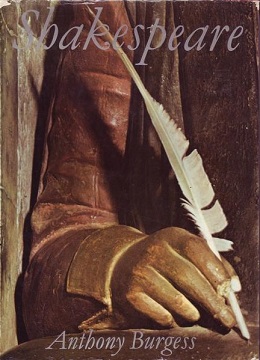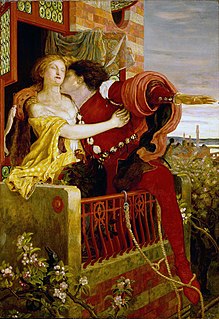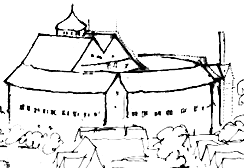
Shakespeare, a biographical and critical study of William Shakespeare by Anthony Burgess, was published in 1970. ISBN 0-7867-0972-3.
| This article about a biographical book on writers or poets is a stub. You can help Wikipedia by expanding it. |

Shakespeare, a biographical and critical study of William Shakespeare by Anthony Burgess, was published in 1970. ISBN 0-7867-0972-3.
| This article about a biographical book on writers or poets is a stub. You can help Wikipedia by expanding it. |

Sir John Falstaff is a fictional character who is mentioned in four plays by William Shakespeare and appears on stage in three of them. His significance as a fully developed character in Shakespeare is primarily formed in the plays Henry IV, Part 1 and Part 2, where he is a companion to Prince Hal, the future King Henry V. A notable eulogy for Falstaff is presented in Act II, Scene III of Henry V, where Falstaff does not appear as a character on stage, as enacted by Mistress Quickly in terms that some scholars have ascribed to Plato's description of the death of Socrates after drinking hemlock. By comparison, in The Merry Wives of Windsor, Falstaff is presented by Shakespeare as the buffoonish suitor of two married women.

The Tragedy of Hamlet, Prince of Denmark, often shortened to Hamlet, is a tragedy written by William Shakespeare sometime between 1599 and 1602. Set in Denmark, the play depicts Prince Hamlet and his revenge against his uncle, Claudius, who has murdered Hamlet's father in order to seize his throne and marry Hamlet's mother.

Macbeth is a tragedy by William Shakespeare; it is thought to have been first performed in 1606. It dramatises the damaging physical and psychological effects of political ambition on those who seek power for its own sake. Of all the plays that Shakespeare wrote during the reign of James I, who was patron of Shakespeare's acting company, Macbeth most clearly reflects the playwright's relationship with his sovereign. It was first published in the Folio of 1623, possibly from a prompt book, and is Shakespeare's shortest tragedy.

Othello is a tragedy by William Shakespeare, believed to have been written in 1603. It is based on the story Un Capitano Moro by Cinthio, first published in 1565. The story revolves around its two central characters: Othello, a Moorish general in the Venetian army, and his treacherous ensign, Iago. Given its varied and enduring themes of racism, love, jealousy, betrayal, revenge, and repentance, Othello is still often performed in professional and community theatre alike, and has been the source for numerous operatic, film, and literary adaptations.

Romeo and Juliet is a tragedy written by William Shakespeare early in his career about two young star-crossed lovers whose deaths ultimately reconcile their feuding families. It was among Shakespeare's most popular plays during his lifetime and along with Hamlet, is one of his most frequently performed plays. Today, the title characters are regarded as archetypal young lovers.

William Shakespeare was an English poet, playwright, and actor, widely regarded as the greatest writer in the English language and the world's greatest dramatist. He is often called England's national poet and the "Bard of Avon". His extant works, including collaborations, consist of some 39 plays, 154 sonnets, two long narrative poems, and a few other verses, some of uncertain authorship. His plays have been translated into every major living language and are performed more often than those of any other playwright.

Henry V is a history play by William Shakespeare, believed to have been written near 1599. It tells the story of King Henry V of England, focusing on events immediately before and after the Battle of Agincourt (1415) during the Hundred Years' War. In the First Quarto text, it was titled The Cronicle History of Henry the fift, which became The Life of Henry the Fifth in the First Folio text.

King Lear is a tragedy written by William Shakespeare. It tells the tale of a king who bequeaths his power and land to two of his three daughters, after they declare their love for him in an extremely fawning and obsequious manner. His third daughter gets nothing, because she will not flatter him as her sisters had done. When he feels disrespected by the two daughters who now have his wealth and power, he becomes furious to the point of madness. He eventually becomes tenderly reconciled to his third daughter, just before tragedy strikes her and then the king.

Shakespeare in Love is a 1998 American romantic period comedy-drama film directed by John Madden, written by Marc Norman and playwright Tom Stoppard.

The Royal Shakespeare Company (RSC) is a major British theatre company, based in Stratford-upon-Avon, Warwickshire, England. The company employs over 1,000 staff and produces around 20 productions a year. The RSC plays regularly in London, Newcastle upon Tyne, and on tour across the UK and internationally.

Ralph Nathaniel Twisleton-Wykeham-Fiennes is an English actor, film producer, and director. A Shakespeare interpreter, he first achieved success onstage at the Royal National Theatre.

The Globe Theatre was a theatre in London associated with William Shakespeare. It was built in 1599 by Shakespeare's playing company, the Lord Chamberlain's Men, on land owned by Thomas Brend and inherited by his son, Nicholas Brend and grandson Sir Matthew Brend, and was destroyed by fire on 29 June 1613. A second Globe Theatre was built on the same site by June 1614 and closed by an Ordinance issued on 6 September 1642.

Shakespeare's sonnets are poems that William Shakespeare wrote on a variety of themes. When discussing or referring to Shakespeare's sonnets, it is almost always a reference to the 154 sonnets that were first published all together in a quarto in 1609; however, there are six additional sonnets that Shakespeare wrote and included in the plays Romeo and Juliet, Henry V and Love's Labour's Lost. There is a partial sonnet found in the play Edward III.

Henry IV, Part 1 is a history play by William Shakespeare, believed to have been written no later than 1597. It is the second play in Shakespeare's tetralogy dealing with the successive reigns of Richard II, Henry IV, and Henry V. Henry IV, Part 1 depicts a span of history that begins with Hotspur's battle at Homildon in Northumberland against Douglas late in 1402 and ends with the defeat of the rebels at Shrewsbury in the middle of 1403. From the start, it has been an extremely popular play both with the public and critics.

Anne Hathaway was the wife of William Shakespeare, the English poet, playwright and actor. They were married in 1582, when he was 18 and she was 26 years old. She outlived her husband by seven years. Very little is known about her beyond a few references in legal documents, but her personality and relationship to Shakespeare have been the subject of much speculation by many historians and creative writers.

Shakespeare's Globe is a reconstruction of the Globe Theatre, an Elizabethan playhouse for which William Shakespeare wrote his plays, in the London Borough of Southwark, on the south bank of the River Thames. The original theatre was built in 1599, destroyed by fire in 1613, rebuilt in 1614, and then demolished in 1644. The modern Globe Theatre is an academic approximation based on available evidence of the 1599 and 1614 buildings. It is considered quite realistic, though contemporary safety requirements mean that it accommodates only 1,400 spectators compared to the original theatre's 3,000.

Shakespeare's plays have the reputation of being among the greatest in the English language and in Western literature. Traditionally, the plays are divided into the genres of tragedy, history, and comedy; they have been translated into every major living language, in addition to being continually performed all around the world.

William Shakespeare was an actor, playwright, poet, and theatre entrepreneur in London during the late Elizabethan and early Jacobean eras. He was baptised on 26 April 1564 in Stratford-upon-Avon in Warwickshire, England, in the Holy Trinity Church. At age of 18 he married Anne Hathaway with whom he had three children. He died in his home town of Stratford on 23 April 1616 at the age of 51. Though more is known about Shakespeare's life than those of most other Elizabethan and Jacobean writers, few personal biographical facts survive, which is unsurprising in the light of his social status as a commoner, the low esteem in which his profession was held, and the general lack of interest of the time in the personal lives of writers. Information about his life derives from public instead of private documents: vital records, real estate and tax records, lawsuits, records of payments, and references to Shakespeare and his works in printed and hand-written texts. Nevertheless, hundreds of biographies have been written and more continue to be, most of which rely on inferences and the historical context of the 70 or so hard facts recorded about Shakespeare the man, a technique that sometimes leads to embellishment or unwarranted interpretation of the documented record.

The Tempest is a play by William Shakespeare, probably written in 1610–1611, and thought to be one of the last plays that Shakespeare wrote alone. After the first scene, which takes place on a ship at sea during a tempest, the rest of the story is set on a remote island, where the sorcerer Prospero, a complex and contradictory character, lives with his daughter Miranda, and his two servants—Caliban, a savage monster figure, and Ariel, an airy spirit. The play contains music and songs that evoke the spirit of enchantment on the island. It explores many themes including magic, betrayal, revenge, and family. In act four, a wedding masque serves as a play-within-the play, and contributes spectacle, allegory, and elevated language.

The Shakespeare authorship question is the argument that someone other than William Shakespeare of Stratford-upon-Avon wrote the works attributed to him. Anti-Stratfordians—a collective term for adherents of the various alternative-authorship theories—believe that Shakespeare of Stratford was a front to shield the identity of the real author or authors, who for some reason—usually social rank, state security, or gender—did not want or could not accept public credit. Although the idea has attracted much public interest, all but a few Shakespeare scholars and literary historians consider it a fringe theory, and for the most part acknowledge it only to rebut or disparage the claims.